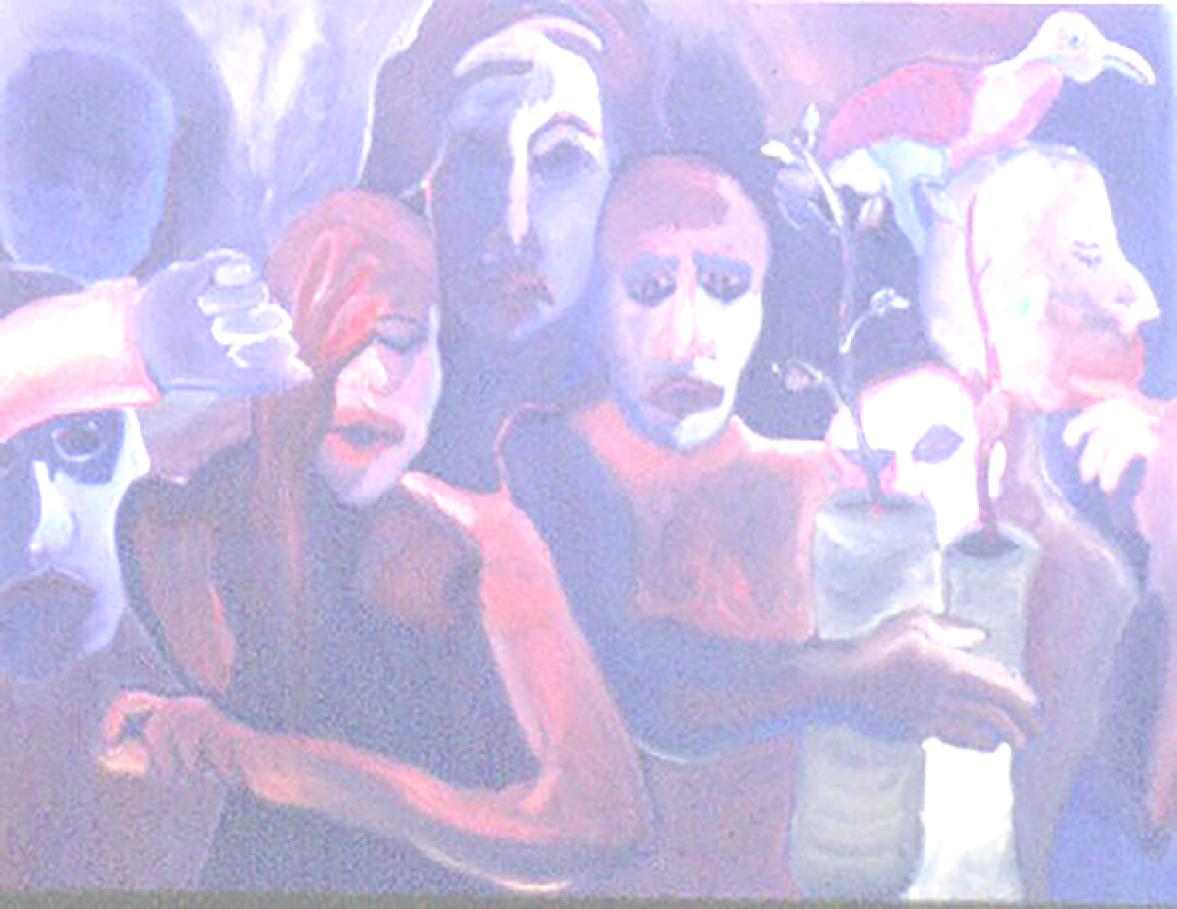I-70 Review
Writing and Art from the Middle and Beyond


Marjorie Stelmach
Marjorie Stelmach is the author of six volumes of poetry, most recently Walking the Mist (Ashland Poetry Press). Previous volumes include Bent upon Light and A History of Disappearance (University of Tampa Press) and Without Angels (Mayapple). Her first book, Night Drawings, was selected by David Ignatow to receive the Marianne Moore Poetry Prize from Helicon Nine Editions. She was one of the three recipients of the first Missouri Biennial Award and most recently, was awarded the 2016 Chad Walsh Poetry Prize from the Beloit Poetry Journal. After thirty years of teaching high school English, she served for ten years as the first director of the Howard Nemerov Writing Scholars Program at Washington University in St. Louis. Her work has appeared in Boulevard, Cincinnati Review, Florida Review, Gettysburg Review, Hudson Review, Image, The Iowa Review, New Letters, and Tampa Review, among others.
Artist's Statement:
I think many poets begin writing because, like a painful tooth that draws the tongue, there is something that won't let go of them. Something undefined announces itself as central, but … the center of what? My first volume of poems gathered my attempts to give meaning to losses I had been too young to understand when they occurred. Loss, then, was central. David Ignatow, in his introduction to my first collection, called it “a prayerful book,” which was news to me. He was right though. He had identified a second center. Two centers? A new bewilderment. I'm still working the territory of that bewilderment, trying to find meaning in loss, seeking answers that, if they exist, exist beyond me. Over the course of six books, much has changed, but perhaps the most important has been a widening of the circle from the territory of my own search to territories other seekers have marked out for their own search. Of course, I was only making up their discoveries as I went along, but those other lives taught me.
My current work concerns the lives of visual artists in old age, specifically how their last works draw on their own lives. I look closely at their artistic development and especially at that last painting or drawing or sculpture and try to glean something of what they discerned in living and working. Then I take on their voices or borrow a structure that seems to rhyme with their approach to art and see where it all takes me. I love the research, love finding some way to enter another life as fully as I can. I always learn something, though often it feels, as Plato claimed, that all knowledge is a retrieval of knowledge we once owned.
If I started writing to address my own bewilderments and longings, perhaps I kept writing because that task of finding meaning has to be endless, it has to last out our lives. What would I do if I arrived at a satisfying answer? Take up commodities trading? Or ping pong? No, I suspect I'd find a flaw in my provisional answer. Then I'd pick up my pencil and get back to work.
Grace Notes
If a sparrow dies in flight, the sky
turns inside out accepting it.
A feather may drift about for days
to mark a moving plot
with the thin blade of a name.
But no sparrow falls.
Dimly prescient, sparrows cup their seeds
in fragile domes, hollow as heavens.
In time the skies crack
and grow wide with fledglings.
Winged like eighth notes,
they hold in hollowed bones
space enough for a grave
should grace prove too slow.
published in Night Drawings
(Helicon Nine Editions)
Our Better Angels
Returning,
we take the old precautions:
avoid wearing white on white,
remember in the pubs
to rise to no one's bait,
betray no recognition
of the sooty gargoyles
lolling above
in their bat suits
and tongues.
Despite our loyalties,
we toss like you
on feather pillows.
On the underground
we evade the gaze
of those, transparently mad,
who have boarded with us
and are speaking
to God.
At least it's peacetime.
Even so,
there's October to weather.
By moonrise,
the lost ones
who huddle under bridges
will have burned the last
of the day's trash;
some won't survive
the night, and we
must learn again,
how to bear it.
High on stone cornices,
gargoyles
sharpen icicles
on the pitiless winds,
while below in the shops
children
are trying on bones.
As November lengthens,
it's hard to remember
our mission.
We're so overdue for joy,
we hook up with strangers,
unfolding our shivering souls
beneath down comforters
that lie
as lightly as kin
on our bodies.
In our reckless need, we neglect
to hide our celestial flesh,
let slip our flawlessness, allow
our wings. By Advent,
we remember the reason
we left here in the first place.
It wasn't the wars, the callousness,
the cold: it may be
impossible to love you.
published in Without Angels
(Mayapple Press)
Parade
The brittle cold's back. The wind at full gust,
plays the corners of my house like a toy kazoo.
Do children play “parade” these days, humming
on a wax-wrapped comb, drumming
whatever pans are allowed? Not likely, I suppose.
How, then, prepare their little hearts for war?
I can feel it still, the buzz that lingered on my lips
for minutes afterward, recall the sting that clung
to my finger-pads, the tingle on my palms. How else
prepare their tender flesh for love?
As always, it comes down to sex and violence: the requisite
alignment of the young with what the future knows
will rarify and rend them, exhaust them in the end,
as I'm exhausted with it all,
with loves proved false, wars proving nothing,
winter after winter of undisciplined winds
and ice enough to drive me indoors where the hums
are kept fastidiously vague, the lighting weak,
the music muted; where, if I lower my guard, my lips
will begin to quiver with the names
of so many gone—that endless parade—and
my palms to open and close of themselves:
supplication / rage; supplication / rage.
published in Falter
(Cascade: Poiema Series)
Lines for the Spider
On the far side of these mountains, rain is falling in my mother's city.
Standing in my doorway in spring sun, I let imagined rain-song fill me.
Just beyond the doorstep, spiders are at work in the tangled grasses
spinning sun-catchers, snagging bits of brightness, weaving
glimpse and gone.
Lingering jewels of dew nudge the light; they won't be long.
They tremble, as they should on a planet spun of time
where we hear not a sound from the spiders, though always
they are present. Earth's workings are immensely still.
Intricate and unrelenting.
I picture my mother on the far side of these mountains, arrayed in cerements
of rain. If I knew how, I'd cover her with fine, sun-woven silks,
but the distance between us is so much more than wishing, and I know
that already, even at this moment—
Listen: the rain song. Listen: the spider.
published in Walking the Mist
(Ashland Poetry Press)
Special Pleading
If each of us were to plead for one endangered species …
I'd plead for emerald dragonflies: skin shimmering
in arsenic green, isinglass wings, eyes
as transfixing as slaughter.
Three hundred million
years ago, this dragonfly's precursors steered
a three-foot wingspan through Pangea's swamps,
wielding a predatory grace.
Diminished now,
they weave their specialized weaponry through
a smoke of mosquitos carving out hollows
in their wake.
If you love them,
you have to love them fast—or start early,
tromping the shores of shallow ponds to praise
their wingless humps
afloat in scum.
By the time they lift from the waters,
four years will have passed in your own
endangered life.
But it's time well spent.
Your reward will be two glorious months
of watching them scatter the light as they
hover and dart,
mate and hunt
in ferocious splendor. Such is the fleeting use
our profligate Earth makes of beauty. But now,
their days as a species
are numbered,
a slide it's unlikely my prayers can stop.
Even so, it's these dragonflies I'd plead for
in the hope that a member
of whatever species
next rules earth might happen upon a single,
exquisite, tissue-glass wing lodged
in the grasses.
published in Lullwater Review
How to Disappear
… like a plain, simple thing.
—Hans Christian Andersen
The Nightingale
Keep still so long
time comes to rest
like dust
on your shoulders.
Then, thin yourself until
it lifts from your skin
like a cloud of gnats
in a gold cast of sun.
Now,
thin further.
Or,
if you'd rather,
linger a while, clothed
in a world-colored substance
that can't be told
from the whole.
Which of you, then—
figure or ground—
is ghost?
It's one of the long arts.
Give it time.
Let all the sweet grief
at your passing pass,
until—de-moted
from every eye that filled
even once with your face—
you are free to be off
at light-speed:
exceed yourself.
If you feel at first
the urge to return,
to assure yourself
of your absence,
that's fine: re-cohere
from your memory of flesh
a provisional presence.
Perch on a limb
out of sight. Sing.
Sing
your diminishment.
Sing like an echo returned
from the shores
of an old fairy tale. Sing,
like a plain, simple thing.
No love
need be revisited now;
no sin undone.
Release your name,
your past, your dust.
Only now it begins—
the after, the life.
published in Cumberland River Review
The Lost Blue of Chartres
By the 12th century, the deep cobalt blue
in the stained glass of Chartres was a secret lost
The blue was born
in an age of faith,
an age of filth.
Some say it derived
from peasant sweat,
from smears
of soot, from piles
of excrement underfoot,
or the muck tramped back
to the worksite from huts
shared with beasts.
Some scholars believe
its source was potash
leached in iron pots
to a white salt. Others
inclined to the abstract
claim
it clunglike mold
to the architects' scrolls⏤
a fur of hubris,
delusion, corruption.
Mystics will tell you
the blue was never born:
it was simply there⏤
in the water, in the air,
in the soil.
Art historians insist
that a blue fog hung
in that century's lanes⏤
a breath exhaled
from birch tree forests.
Folktales swear
the blue was pressed
into the villagers'
very skin
that it darkened
their life lines,
the creases of their faces,
the backs of their knees.
Or maybe it arose
in diaphanous coils
from votive candles
to hover, cold,
in the half-built hulk.
But everyone agrees
it's gone.
Like so much else.
Like souls.
Those who long for the blue
even now
must turn to prayer:
Lord of our benightedness,
give us this day
our impure world
to make of it
what bread we can.
What legends of our own.
What stains. What light.
published in The Gettysburg Review